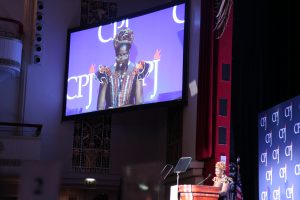
New York – FrontPage Africa’s Mae Azango was awarded the Committee to Protect Journalists’ prestigious Press Freedom Award at a glittering ceremony in New York Tuesday night. The ceremony was attended by America’s media elite including the New Yorker’s David Remnick and CPJ board member Arianna Huffington of the Huffington Post.
Azango was one of four reporters recognized for their courage in reporting in 2012. Two of the four, Chinese journalist and Azimjon Askarovof Kazakhstan were in jail and unable to accept the awards in person. A fourth, Mauri König has survived beatings and death threats for his work exposing child trafficking in his native Brazil.
CPJ Video of Mae courtesy of CNN
Read Mae’s acceptance speech here.
“We are inspired by these journalists who have paid a high price for their enduring dedication to the truth,” said CPJ Executive Director Joel Simon.
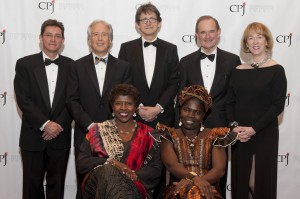
Azango’s award came after she endured death threats for her reporting on the health impacts on women of female genital cutting in Liberia in a collaboration between New Narratives and FrontPage Africa earlier this year. The threats against Azango and her 9-year-old daughter forced the pair into hiding for three weeks until an international campaign including CPJ, Amnesty International and Nicholas Kristof of The New York Times and the dean and students of Columbia University forced government ministers to take their first public stance against the traditional practice. FrontPage and its reporters have continued to receive threats for subsequent reporting on this sensitive topic.
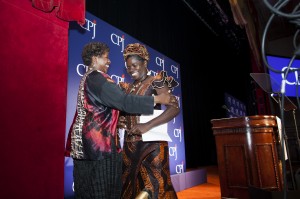
President Ellen Johnson Sirleaf recently dismissed Azango’s reporting claiming, incorrectly, that Azango had fabricated the death threats in order to win a visa to the US. In fact, Azango was denied a visa for a long-planned trip to cover the IMF/World Bank meetings because of the death threats. It was only when the US embassy was persuaded she was not at risk of claiming asylum in the US that she was allowed to travel to the meetings. Azango has since traveled to the US on three occasions.
The committee lauded Azango for her courage in continuing to report on cutting and for starting a debate on the subject that had been considered taboo in Liberia for so long.
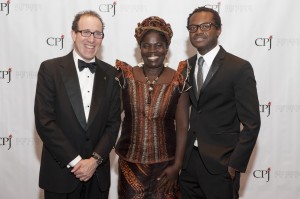
Azango told the crowd: “Speaking the truth about female genital cutting in my country has long been a dangerous thing to do. But I thought it was worth risking my life because cutting has claimed the lives of so many women and girls, some as young as two. In Liberia, we have one of the highest rates of maternal death in the world and cutting is a big factor in that. But parents in our traditional societies were told that cutting was the right and “clean” thing to do. And that their daughters had no future without it. I knew if we started to talk about it and they knew the truth, many parents would choose a different path.”
“As a woman I knew that many women who went through this ritual of cutting as a child are still bitter and resentful,” said Azango. “For example: the lady in my story is still living with the trauma of being held down by four women while the fifth lady cut her clitoris off with a knife that was used on 25 other girls.”
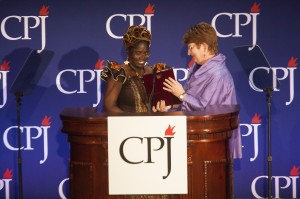
Azango also told the crowd that after Liberia’s long civil war Liberians understood independent media like that done by FrontPage Africa and New Narratives was more important than ever.
“The war went on for so long because warlords were able to take advantage of the absence of truthful media to spread lies and propaganda that turned Liberians on each other,” Azango said. “Sometimes they even turned on their own family.
“We have learned the importance of independent, truthful media the hard way. We do not take it for granted. We understand that information is essential if we are to hold our leaders accountable and make smart decisions about our country.”
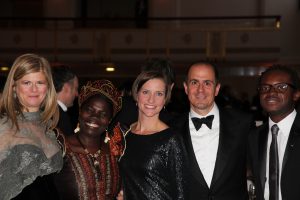
Azango thanked FrontPage publisher Rodney Sieh for his courage in publishing the reporting and encouraging independent, honest reporting in all his reporters. She also thanked her bosses at New Narratives, Joanne Devane and Prue Clarke, who guided her reporting of the story and fought for protection for Mae from police and government during the ordeal. She promised to continue to report on the problems faced by women and children in Liberia and “give a voice to those who do not have a voice” in Liberian society.
